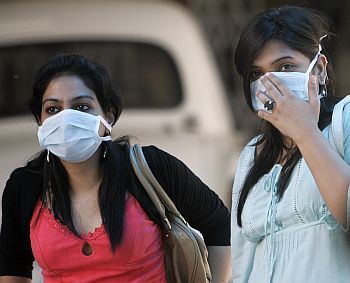
'Unless it is a situation where a patient must be hospitalised, that patient can be very easily treated at home... Patients recover in situations where they are more comfortable.'
Dr Om Shrivastav, who treats swine flu cases at Mumbai's Jaslok and Kasturba hospitals, speaks to Vaihayasi Pande Daniel/Rediff.com
According to the latest figures released by the Union health ministry on February 27, the number of deaths from swine flu across the country was 965, with the number of people affected by the H1N1 virus or swine flu across the country being 17,000.
In Mumbai alone, 79 more new cases were detected on February 27, says a senior government doctor, treating the swine flu affected in Mumbai, whose name has been withheld on request: "Too many cases. Bed crunch is unimaginable. Hopefully numbers will fall soon."
As per a response received from the BrihanMumbai Municipal Corporation's public health department on February 18 to an RTI application filed by Mumbai resident Chetan Kothari, till February 17 the city's hospitals have treated 108 cases of swine flu while one death has been recorded. The department has also established a helpline at 022-24114000.
There is a belief, among experts in the field whom Rediff.com spoke to, that the commercial shortage/absence, across India, of vaccines -- the trivalent influenza vaccine Vaxigrip that inoculates against this flu -- to protect those most susceptible to swine flu, is not worrisome.
Adds the government doctor: "The shortage of vaccines is not really worrisome. The vaccine supply being curtailed may be a good thing. If the vaccine is freely available it's only going to feed panic and indiscriminate use. (I am not aware of) evidence to show that Nasovac-S nasal drops (manufactured for influenza by the Serum Institute of India in Pune and said to protect against swine flu too) helps. I am wary of blanket recommendations in a clinical condition that has so many imponderables."
"But the shortage of beds is a worry (Mumbai, for instance, has approximately 45-50 beds to admit and treat swine flu cases). Isolation is a need to be addressed urgently. The government has given a directive for all hospitals to arrange isolation (areas) by October."
Most private hospitals in India, however large, do not have the facilities to admit patients affected and infectious with H1N1 because they do not have the necessary isolation procedures in place.
Hopefully the impact of swine flu will dwindle in the foreseeable future. Case numbers may be plateau-ing. The arrival of warmer weather is expected to control the spread of swine flu, according to experts. A rise in temperatures last weekend, across north India, as well as western India (Mumbai recorded 38.9 degrees C on Sunday, February 22) may herald the arrival of spring.
There is a perception among medical experts that the government needed to have done much more to aggressively promote awareness of the illness from the start of its onslaught.
The public needed to have had access to enough information so their concerns were addressed and fears allayed. They need to be kept up to date on how the virus is responding to current treatment methods.
Experts also point out the need for the government to work much harder on making sure the chain of infection is broken, to stop it travelling from one person to another at such speeds in a crowded country like India. Public attentiveness would help, too.
Knowing the importance of hygiene would go a long way -- hand washing, alcohol rubs -- especially among children and young students. Equally key: Containing cluster infections.
Additionally, establishing a few more medical labs to test people for the virus -- as long as there is not a run on the labs with people testing even when they have the first sniffle -- might be helpful.
Still more useful would be a cheaper test and quicker results; at the moment results take up to 72 hours to come in and are too late in coming in a situation where having a line of treatment up and going quickly is crucial.
Dr Om Shrivastav, head of the department of infectious diseases at Jaslok Hospital, Mumbai, is an acute care specialist. Jaslok is one of the few private hospitals that treats the H1N1 affected and has special isolation facilities meeting international standards.
Dr Shrivastav also treats swine flu patients at the BMC-run Kasturba Hospital for Infectious Diseases in Byculla, central Mumbai, which is the only municipal facility in Mumbai, designated by the Maharashtra government, treating the swine flu affected currently.
Dr Shrivastav offers his view and expertise of this rapidly evolving situation in an interview to Vaihayasi Pande Daniel/Rediff.com
Why has the number of cases of swine flu in the country suddenly increased this season?
There are a number of reasons.
Most likely there is probably a new strain that is operational. Infections go through these kinds of changes from time to time. The amount of people being affected and their clinical presentation is changing. And they are big in number.
The public is getting alarmed very quickly. What are the precautions that people need to take?
There isn't a need for any panic or alarm at this time.
The need is awareness.
If you have got symptoms, you should be seeing your closest hospital or your closest doctor at the earliest. Making the diagnosis and starting the treatment are the key.
Beyond a certain kind of delay the incidence of complications (is higher) -- particularly in the high risk populations of pregnant women, children, the elderly, the very young, or people who are on steroids, who have got underlying illnesses like cancer, immunodeficiency. If for these categories you delay the treatment and diagnosis, then the chances of complications become significantly higher after the fever rises.
What if you have a frail relative or a child at home who seems to be presenting symptoms of swine flu, but you are not certain? And you are not able to do the appropriate tests anywhere.
Shouldn't you be reluctant to take your child to a government hospital that specialises in treating swine flu cases, to test or treat? Because, should your child not have swine flu, then they would definitely contract it through exposure at such a facility?
The simplest and most common thing to do -- if there is a place where you can keep the child, in a single room or in partial isolation, the best place is in your own home -- then it is not necessary to hospitalise.
If you feel there is a high risk, and if your doctor examines and feels the same way, you should start treatment and keep the child in a single room, or as far away from other people as possible for the duration of the treatment -- that is the five-day period.
But there aren't any labs that test for swine flu, for instance, in Mumbai.
At Kasturba Hospital I run an isolation facility, which has state of the art isolation (facilities) where I am admitting and treating patients with swine flu now. We have been in operation for a little over a year.
I treat such people in that hospital. That is for people who require to be kept in the hospital. If the severity of the illness is far more it is not just like an intensive care.
If you start the treatment at the right time and the child is symptomatic but doesn't need to be hospitalised, the simplest thing is to keep the child in the confines of your home and not allow the child to be in touch with others. So that they could not spread the infection.
But what if your child or relative needs hospitalisation, but has not been tested?
If the child (or relative) has to be admitted, then the place that the government has outlined (in Mumbai, for instance) is Kasturba hospital.
Private hospitals are going to be a little bit reluctant with swine flu (cases) because there is a threat of the infection going on to other people.
What you can do is: Get the treatment started at the earliest possible time and try to preempt a situation where a child has to be admitted. Children require the (care) of their parents. They simply cannot be put in isolation wards.
Those are the challenges of admitting a child. Unless a child is really, really, sick I don't recommend admission.
Right now I am looking after a number of children who are being kept at home. I see the child once a day, at least, so that there is no worsening. Keep them at home and in five days time they are better.
So if the person/child does not look like they have a very serious case, rather than going to a facility that concentrates on swine flu, they should be kept at home?
Unless it is a situation where a patient must be hospitalised, that patient can be very easily treated at home... It is not something I discourage. In fact I encourage it.
Patients recover in situations where they are more comfortable. Home-based therapy is fine so long as in my clinical assessment I don't think the patient requires any hospitalisation.
Do you tell the person that they have swine flu? Or would that scare them?
If a patient has a mild case of swine flu and they look like they will come through easily, do you tell them they might have it?
Once you are in possession of the facts and once you are being dealt with by someone who knows what they are talking about, I cannot see what the need is to be scared.
Because patients are often not in possession of the facts and cannot test themselves for swine flu even in a city like Mumbai.
Yes, you can. I test at the Kasturba labs (the test is free at the Kasturba hospital and government facilities). There are private laboratories that do the test for you. (Like) Relicare. And Metrolabs (both charging Rs 5,000 per test).
What good is anxiety without the facts? If you have the facts, there really isn't any need to be anxious. If you are starting the treatment in time, and if you actually having the right treatment and the right dose, you will respond and there is no need to be anxious of that.
How are the facilities at government hospitals like Kasturba?
I am admitting patients at Kasturba every day. They are doing the best that they can with the resources that they have. Which always -- like any government hospital -- can be more. With the resources and manpower that they have, they are doing a very good job. The care is stupendous.
Is there anything available to protect one or cure swine flu?
There is a curative medicine which is Oseltamivir. There is also a vaccine which is recommended which is protective -- trivalent influenza vaccine -- Vaxigrip.
Is the drug helping the newer strains as well?
In most parts.
So who should take the vaccine?
People who are in high risk categories should take the vaccine.
Where is it available?
The vaccine is commercially available. It is in short supply at the moment (Dr Shrivastav later confirmed that this vaccine is no longer commercially available.)
In your experience, is there something that hospitals abroad, that are handling swine flu, are doing better?
Their problems are different. If you see the incidence of swine flu in Australia or New Zealand -- there are not enough people for it to go into an outbreak.
But in India with one plus billion people, any amount of overcrowding is actually going to make the progression of the virus significantly higher.
Their challenges are different. Our challenges are specific and peculiar to our country. You have to adapt what you have in terms of resources to what you can provide to public health in the country that you live in.
I wouldn't compare what America has done, what the UK has done, what Europe is doing or any of these nations have done, because the volume of people likely to affected, there is significantly smaller than what we are likely to have.
There are many more cases in Rajasthan and they have been coming through from Kerala, but how many cases does Maharashtra have?
A number of them.
The numbers are higher this year than they have been in the last two or three years. But it is nothing like a crisis as yet. Hopefully, in the next ten days' time, when the temperatures are warmer and the environmental factors have changed, the virus should quietly ebb down and die a natural death.
In a city like Mumbai, which is really crowded, one has to be careful.
Any part of India. Can you tell me any part of India that is not crowded?
This article was updated thrice, on February 23, 27 and 28 2015.











